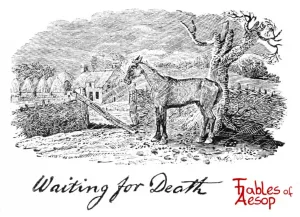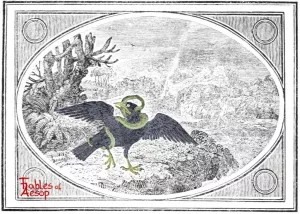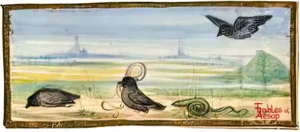A hungry Crow flew down and grabbed a Serpent who looked dead but was alive and turned and bit him with a fatal bite. Bye, bye Crow.
Desire things you don’t understand and you accept the consequences.

Townsend version
A crow in great want of food saw a Serpent asleep in a sunny nook, and flying down, greedily seized him. The Serpent, turning about, bit the Crow with a mortal wound. In the agony of death, the bird exclaimed: “O unhappy me! who have found in that which I deemed a happy windfall the source of my destruction.”

JBR Collection (The Raven and The Serpent)
A hungry Raven, searching for prey, came across a Snake lying at full length on a sunny bank. He seized him in his horny beak and would have devoured him, but the Snake, twisting and turning about, bit the Raven with his venomous fangs, so that he died in great pain. In dying, he confessed that he was justly served for seeking to satisfy his appetite at the expense of another’s welfare.

Samuel Croxall (The Raven and the Serpent)
A HUNGRY Raven, flying about in quest of his prey, saw a Serpent basking himself upon the side of a sunny bank: down he soused upon him, and seized him with his horny beak, in order to devour him: but the Serpent, writhing to and fro with the pain, bit the Raven again with his venomous teeth, to such a degree, that he could not survive it. The Raven, in the agonies of death, is said to have confessed that this judgment happened to him justly; since he had attempted to satisfy his craving appetite at the expence of another’s welfare.
THE APPLICATION
They who are of a ravenous, greedy temper, and for swallowing all that comes in their way, may chance to meet with a sting in the end. When people are actuated by an insatiable avarice, they stick at nothing; without considering the lawfulness, or even the real emolument of snapping at all, right or wrong, down it goes; and, if it has but the appearance of gain, they are for making a seisure, let the consequence be what it will.
Thus the covetous, whom God and man abhor, punishes himself for his own iniquity, Being deaf to the voice of conscience, and the dictates of natural reason, and blind to every thing but his own vile selfish views, throws himself after getting, with a precipitate violence, and often dashes himself to pieces upon an unseen rock.

Thomas Bewick (The Raven and The Serpent)
A Raven in quest of food, seeing a Serpent basking in the sun, soused down, seized it with his horny beak, and attempted to carry it off. But the Serpent, writhing with the pain, twisted its elastic coils so firmly about the Raven, and bit him with such envenomed fierceness, that he fell to the ground mortally wounded. In the agonies of death, the Raven confessed this was a just punishment upon him, for having attempted to satisfy his greedy appetite at the expence of another’s welfare.
APPLICATION.
When men suffer their passions to set aside their reason, they soon become sensual in their appetites, and inordinate in their desires. Moral rectitude takes its departure from their minds, and led by their evil spirit, they soon become fitted for the commission of any enormity. They give the rein to their unbridled lusts, and regardless of consequences, stop at nothing to gratify their brutal desires. But if we mark the progress of such men through life, it will be found that, besides losing the great and virtuous pleasures of self-approbation, and incurring the stings of a guilty conscience, their wicked career often meets just punishment from retaliations in kind, which the objects of their iniquitous proceedings unexpectedly retort upon them.


L’Estrange version (A Raven and A Snake)
As a snake lay lazing at his length, in the gleam of the sun, a raven took him up, and flew away with him. The snake kept a twisting and turning, till he bit the raven, and made him curse himself for being such a fool, as to meddle with a purchase that had cost him his life.
Moral
Nature has made all the necessaries of life, safe and easie to us, but if we will be hankering after things that we neither want nor understand, we must take our fortune, even if death it self should happen to be in the case.

Gherardo Image from 1480

Anguis et Milvus
Milvus raptum anguem, in altum volans, ferebat. At ille, repente conversus ipsumque morsu feriens, illico interfecit. Quapropter anguis morienti milvo aiebat, “Quid tam stultus fuisti ut eos laedere ac ad mortem rapere velles, qui nullam tibi iniuriam intulere? En ut merito eadem refers quae mihi facere parabas.”
Perry #128


